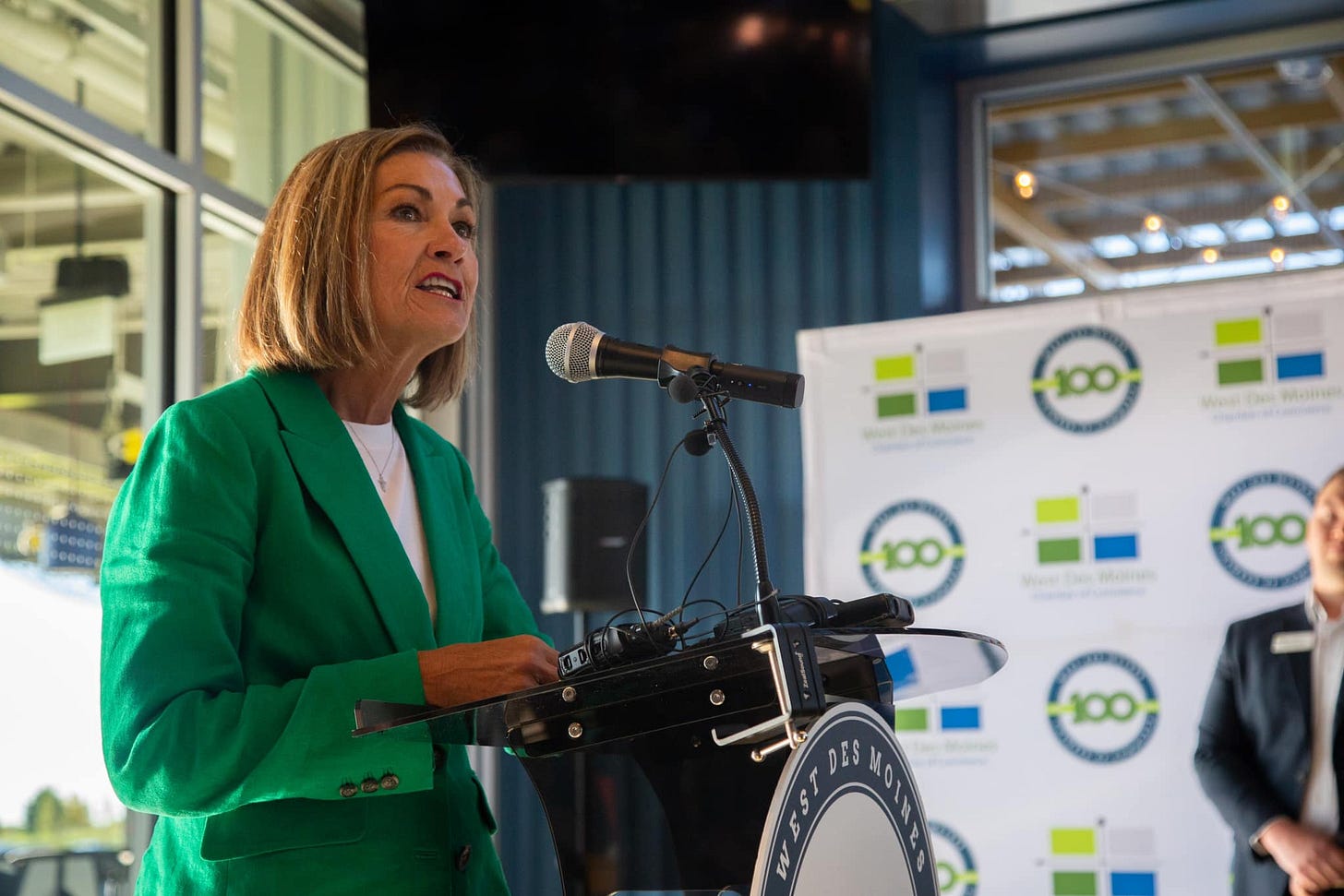Morning Digest: In a surprise, Iowa Republican Kim Reynolds is first governor to retire this cycle
An unexpected open seat is an enticement for the GOP—and an opportunity for Democrats

Leading Off
IA-Gov
Republican Gov. Kim Reynolds shocked the political world on Friday when she said she would not seek reelection to a third full term, making her the first sitting governor this cycle to announce their retirement.
Reynolds' decision all but guarantees a host of ambitious Republicans will pile into the race to succeed her. It also creates a rare opening for Democrats, who nearly unseated Reynolds during her first campaign for election in the middle of Donald Trump's first term.
At the top of Democratic wish lists is state Auditor Rob Sand, the last remaining Democrat who holds statewide office in Iowa. Sand said in February that he was considering a run for governor, and fundraising reports showed him with a sizable $7.5 million stockpiled at the end of 2024. (Reynolds, in a possible hint she was preparing to move on, had just $3 million banked.)
For Republicans, the potential field is much larger. One candidate, far-right former state Rep. Brad Sherman, had already launched a bid before Reynolds made her announcement, but he's sure to be eclipsed by much bigger names.
The roster already includes three of the state's four members of the House of Representatives: Randy Feenstra, Ashley Hinson, and Zach Nunn. In separate statements, both Feenstra and Hinson did not rule out running, while NOTUS reported that Nunn is considering the race. (According to Ballotpedia, Iowa allows federal candidates to transfer their war chests over to state accounts.)
State Attorney General Brenna Bird, meanwhile, quickly said she was weighing a bid. Late last year, MAGA adherents seeking to browbeat Republican Sen. Joni Ernst into supporting all of Trump's cabinet picks touted Bird as a possible intra-party challenger, but Ernst soon caved, ending the chatter.
Politico also mentions state Agriculture Secretary Mike Naig as a potential candidate. NOTUS further floats Matthew Whitaker, a former acting attorney general during Trump's first term who's now his ambassador to NATO. Whitaker campaigned for the Senate in 2014 only to take fourth place in the primary against Ernst.
More names are certain to emerge in the contest to replace Reynolds, who was elevated to the governorship in 2017 when then-Gov. Terry Branstad stepped down to serve as Trump's ambassador to China.
As a state senator, she had first been elected with Branstad during the 2010 GOP wave when the pair unseated Democratic Gov. Chet Culver and Lt. Gov. Patty Judge by a 53-43 margin.
The two easily won a second term four years later, but Reynolds struggled when she led the ticket in 2018. That year, she held off Democrat Fred Hubbell in a close 50-48 race. Iowa reverted to form during her last election, though, in which she prevailed by 58-40.
The state, though, has shown some small but meaningful signs that it might be less inclined to deliver more big wins for Republicans next year, one of which stemmed from a decision Reynolds herself made.
In January, Democrat Mike Zimmer flipped a seat in the state Senate that Trump had carried by a 21-point margin—a seat that had become vacant only because Reynolds tapped its previous occupant, Chris Cournoyer, as her new lieutenant governor. Two months later, Democrats chalked up a similar overperformance in another deep-red legislative seat, falling just short in a district Trump won by a daunting 27 points.
At the same time, polling of all 50 states from Morning Consult has shown Reynolds as the most unpopular governor in the country for five quarters in a row. New data released the day before her announcement found her with a 44-49 approval rating, the only governor with a negative score.
Should the mood that's powered strong showings for Democrats and poor numbers for Reynolds continue into next year, the party could win the governorship for the first time since 2006, which was also the last time the post was open.
Thirty-eight states will hold races for governor this year and next, and we’ll be on top of all of them. There’s no better way to stay up-to-date on this crucial battleground by reading The Downballot—and there’s no better way to ensure we can keep bringing you peerless coverage of elections in the states by upgrading to a paid subscription today:
1Q Fundraising
TX-Sen: John Cornyn (R-inc): $2.5 million raised, $5.7 million cash on hand
PA-08: Rob Bresnahan (R-inc): $830,000 raised
Senate
MI-Sen
Pastor Lorenzo Sewell, who delivered a prayer during Donald Trump's inauguration in January, tells the Detroit News he's considering seeking the Republican nomination for Michigan's open Senate seat. Sewell, who is Black, is a rare prominent Trump supporter in Detroit, a deep blue bastion that voted for Kamala Harris by a 90-8 margin last year.
Governors
CO-Gov
Sen. Michael Bennet launched his campaign on Friday to succeed termed-out Colorado Gov. Jared Polis. First, however, Bennet will face Attorney General Phil Weiser, who entered the Democratic primary in January, before the general election in what's become a liberal-leaning state.
Bennet began the race with endorsements from several prominent Centennial State Democrats. His most prominent backer is fellow Sen. John Hickenlooper, who immediately preceded Polis as governor and spent several months competing against Bennet in the 2020 presidential primary. Also in Bennet's corner are Reps. Jason Crow and Joe Neguse; Denver Mayor Mike Johnston; and the state's top legislative leaders, state Senate President James Coleman and state House Speaker Julie McCluskie.
Bennet surprised observers at the end of February when he started to talk about running for governor, and his interest helped deter several candidates from entering what almost everyone anticipated just months ago would be a packed race.
Both Crow and Neguse were among the candidates who previously indicated they were eyeing the contest, and the latter only made it clear he wouldn't run on Friday when he endorsed Bennet. (Crow decided to stay put last month when he became recruitment co-chair at the DCCC.) Secretary of State Jena Griswold also decided earlier this month to run to replace Weiser, who cannot seek a third term as attorney general, rather than campaign for governor.
Weiser, however, says he's not going anywhere. The attorney general put out a statement just ahead of the senator's formal entry saying, "I am the fighter Colorado needs as our next governor." Weiser also argued that Bennet, who was reelected to a six-year term in 2022, would better serve the state by remaining in the Senate at a time when "we need experienced Democratic leaders in Washington."
Former Sen. Ken Salazar also indicated Friday that he remained interested in running for governor. Salazar, who pointed out that he once held the offices that Bennet and Weiser now occupy, said in a statement that "more candidates may still emerge before" next year's primary.
Bennet became a senator in 2009 when then-Gov. Bill Ritter appointed him to replace Salazar when the latter resigned to become Barack Obama's secretary of the interior. He narrowly survived a difficult reelection during the 2010 GOP wave but won each of his two subsequent races by increasingly wider margins.
Should he win the governorship, Bennet says it would fall to him, rather than Polis, to name a successor to his seat in the Senate. But while there's already intense speculation about who he could pick, it will only matter if he wins next year.
NV-Gov
Former Nevada Gov. Steve Sisolak, who lost his bid for reelection in 2022, unexpectedly told the New York Times in an interview published Friday that he's weighing a possible comeback bid.
"We're going to wait and see what happens as we go through the next few months of the Legislature," said the 71-year-old Sisolak. "I'm not ruling it out—I'm looking into it. I've been encouraged by a lot of people to run again, and I'm considering it."
The development may not come as welcome news to Nevada Democrats, however, who've looked ready to rally around Attorney General Aaron Ford as they seek to oust the man who unseated Sisolak, Republican Gov. Joe Lombardo. Ford has not officially launched a campaign, but he all but confirmed he'd run back in December.
Nevada's governorship was the only one in the country that flipped from blue to red in the previous midterms, when Lombardo knocked off Sisolak 49-47 even as Democratic Sen. Catherine Cortez Masto won a second term 49-48. Sisolak did not offer a timetable for making a decision but said he was currently polling the race.
NY-Gov, NY-17
Republican Rep. Mike Lawler told conservative host Mark Halperin Thursday he'd decide "sometime in June" if he'll challenge Democratic Gov. Kathy Hochul. Lawler, who currently holds one of the most competitive House seats in the nation, said he wants to see if there's a "pathway on paper" for him to unseat Hochul in what remains a challenging state for Republicans.
TX-Gov, TN-Gov
In a new article, Axios' Andrew Solender provides a host of updates on members of the House who might—or might not—seek higher office next year.
One of the more notable developments comes in Texas, where Democratic Rep. Joaquin Castro declined to rule out a bid for governor, saying, "If I make any decisions, I'll be sure to let you guys know." Castro has flirted with running statewide many times in the past, however, and has never gone for it. Solender adds that another House Democrat, Veronica Escobar, is a no, according to an unnamed source.
Meanwhile, in Tennessee, Republican Rep. Tim Burchett no longer seems interested in the open governor's race. Instead, he tells Solender that he'd like to be appointed to succeed Sen. Marsha Blackburn if she wins the governorship next year. Blackburn has yet to formally kick off a campaign, but limited polling shows her as the heavy favorite in the GOP primary.
David here, publisher of The Downballot! We’re a small, independent outfit, and we count on readers like you to keep the lights on. If you haven’t already, we’d be so grateful if you’d consider becoming a paid subscriber. Thank you.
House
CO-08
Former Democratic Rep. Yadira Caraveo will likely announce this week that she'll run to reclaim her old House seat from Republican Rep. Gabe Evans, the Colorado Sun reports. The Sun adds that, while Caraveo's original announcement for last week was postponed, she's been contacting her old backers about her "plans for the future."
Evans narrowly unseated Caraveo 49-48 as Donald Trump was carrying Colorado's 8th District 50-48. State Rep. Manny Rutinel previously entered the Democratic primary for this seat, which includes the northern Denver suburbs and Greeley area.
MI-10
Democratic state Sen. Kevin Hertel, who'd previously been mentioned as a possible candidate for Michigan's 10th Congressional District, tells Gongwer News he won't seek the seat that Republican Rep. John James is leaving behind to run for governor. Three Democrats are already running for this competitive seat based in the suburbs north of Detroit: Army veteran Alex Hawkins, former prosecutor Christina Hines, and Pontiac Mayor Tim Greimel. No Republicans have joined the race yet.
Judges
NC Supreme Court
The North Carolina Supreme Court reversed the central part of a week-old ruling by the state Court of Appeals on Friday, holding that some 60,000 voters in last year's race for the state's top court should not have their ballots retroactively tossed out because their voter registrations were incomplete.
However, the Supreme Court largely kept in place the appellate court's order to throw out as many as 7,000 ballots from overseas voters, prompting Democratic Justice Allison Riggs to ask a federal court to intervene to preserve her 734-vote victory over Republican challenger Jefferson Griffin.
U.S. District Judge Richard Myers declined to block the Supreme Court's order from taking effect, though he did bar the state Board of Elections from certifying any results without his say-so. Riggs could still appeal Myers' decision to the Fourth Circuit Court of Appeals, but she had yet to do so as of Sunday evening.
That means that, at the moment, the Supreme Court's Friday ruling stands. All six justices hearing the case agreed that more than 60,000 ballots cast by voters who did not include their Social Security or driver's license numbers when they registered to vote were valid, despite protests by Griffin. (Riggs has recused herself.)
Though state law has required such information for two decades, officials did not update registration forms to require that voters share their identification numbers until 2023, and they never contacted voters with deficient registrations to remedy the problem. Riggs had argued—and the Supreme Court agreed—that ballots cast by such voters should be counted, since they complied with state rules at the time of the election.
The court was divided, however, regarding two other categories of voters: military and overseas voters who did not provide copies of their photo identification along with their absentee ballots, and voters abroad who've never lived in North Carolina but whose parents once did.
Four Republican justices voted to uphold the Court of Appeals' ruling that votes in these two categories should not count. However, in a sharp dissent, Democratic Justice Anita Earls noted that both types of voters were protected by "longstanding rules [that] were established well before the election." (A second Republican, Richard Dietz, also dissented.)
Earls also pointed out that Griffin's challenges apply to, at most, just a handful of Democratic-leaning counties out of the 100 in the state. As a result, an impacted voter registered in Guilford County could have their vote discarded while a similarly situated voter in Wake County would not.
"Explaining how that is fair, just, or consistent with fundamental legal principles is impossible," Earls wrote, "so the majority does not try." It's not clear exactly how many voters might be affected, but Earls said the figure could range from 2,000 to 7,000.
Under the Supreme Court's ruling, overseas voters who did not submit photo ID will have 30 calendar days to "cure" their ballots after officials send out notice (an increase from 15 business days ordered by the Court of Appeals). Voters who've never lived in North Carolina, however, have no means of redress.
Federal courts, though, may still have the last word, since Riggs has argued that Griffin's challenges violate the U.S. Constitution's guarantees of due process and equal protection of the law. While the Fourth Circuit previously declined to take over the case, it said it could weigh in on the dispute if issues concerning federal law remain unresolved after litigation concludes in the state courts.










The suspect arrested for torching a part of Governor Shapiro's home said he planned to beat Shapiro with a hammer if he saw him: https://www.spotlightpa.org/news/2025/04/pennsylvania-governor-mansion-arson-attack-hammer-shapiro/ It's like Paul Pelosi again, but also potentially a religious hate crime. They had the Seder the night before the fire.
Kim Reynolds deciding to not run for a third term was the best news I've heard on Friday. She almost lost her seat during the 2018 blue wave. I wonder what made her leave, did her husband's cancer come back?
Either way, good riddance. Maybe Iowans can flip that governor's seat and Ernst's seat but it's going to take the right candidate and political headwinds for that to happen.